Fishing, Hunting, & Trapping
Hunting: Learning to Hunt | Survival 101
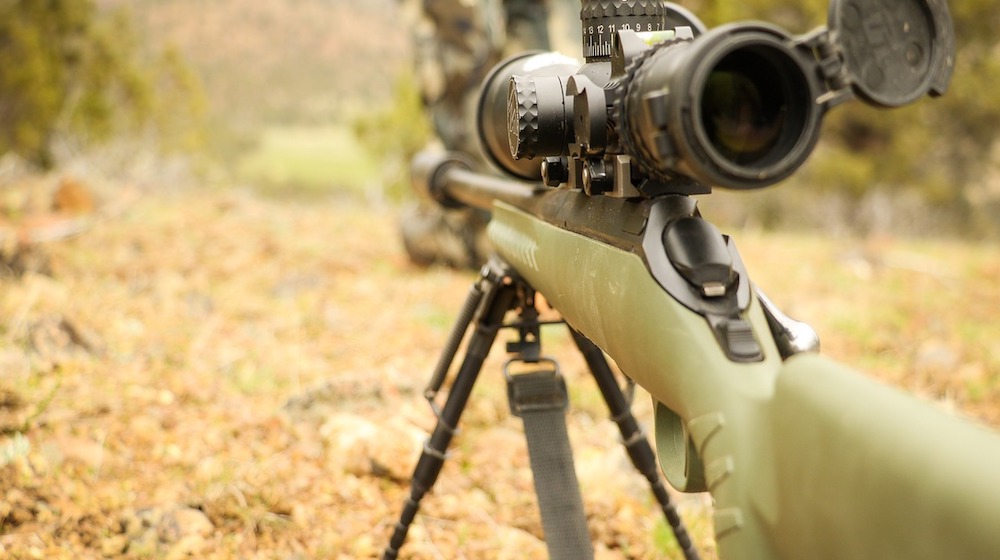
Hunting is an invaluable skill in a survival scenario. You can start it out as a sport but when the SHTF, it will become second nature to you.
Hunting to Live, Living to Hunt: A Vital Survival Skill
There’s little doubt that hunting is a skill that could come in handy in an SHTF scenario. When supermarket shelves are picked clean, shipping lines are disrupted, and panic has set in across all populous areas, well, let’s just say your family probably isn’t going to be frequenting your favorite neighborhood restaurant anymore. So what exactly is hunting and what do you need to do to learn to hunt?
Hunting Is A Lifetime Sport
The best survival skills are not just those that can bring joy to your daily life, but also those that are useful when the SHTF. That’s why I always say hunting is a “lifetime sport.” Like most other lifetime sports, you can enjoy hunting well into your golden years.
This Seemingly Simply Tool Completely Changed Hunting All Over the World…
1. Weapons Training
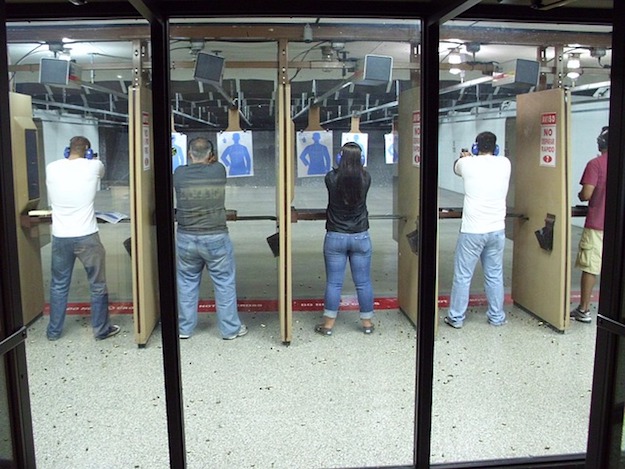
Knowing how to handle weapons is definitely a must when you want to go hunting. Cleaning, maintaining, caring and shooting your weapon is the first thing you need learn. This must be done with intent and on a regular basis.
2. Weapons Safety

Once you’ve learned how to shoot, the next most important thing is weapon safety. The chances of shooting yourself or others by just handling the weapon alone are greater without learning this very important skill.
3. Know What And Where You Can Hunt
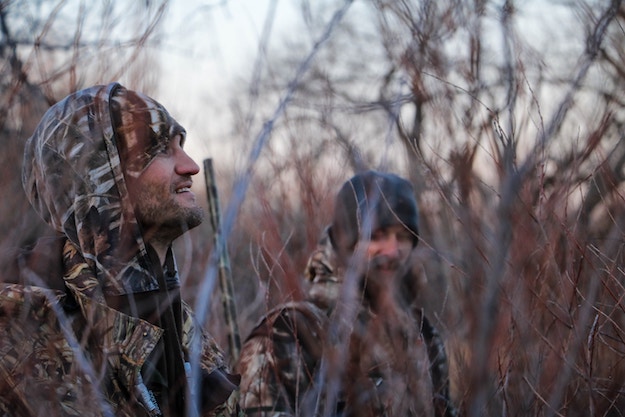
Your state has hunting regulations for what game animal you’re allowed to hunt, where to hunt and which weapons you’re permitted to use. Search for hunting laws in your respective state and familiarize yourself with each of them.
4. Acquire A Hunting License
You cannot just go hunting in your state without first acquiring a hunting license. These days you purchase a license online. Most government websites already have specifics on the hunting laws, licenses, and permits you can learn about online.
5. Tracking & Stalking
Hunting takes skill in scouting which game animal is present in the area. You can’t just walk around and expect a deer or moose to walk up on you. Learn to identify tracks, stool and food source location. Observe tracks made by dangerous animals such as grizzly bears, wolves or mountain lions and avoid them at all costs. There are also different pieces of equipment made available in online stores for scouting game.
6. Camouflage
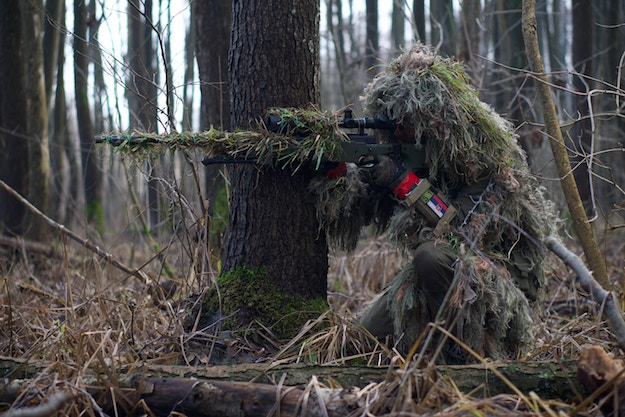
Picking the right tree to wait upon your game animal is also vital. You can either use a hunting blind or clothing like a ghillie suit for extreme stealth. The direction of the wind is also vital in choosing your location. Most game animals have a very sensitive sense of smell.
7. Hunting With Dogs
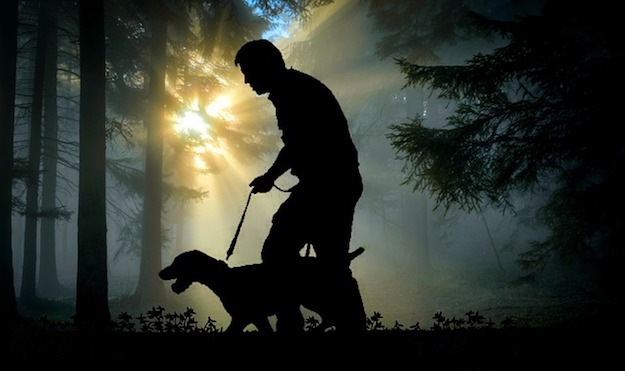
Hunting is spending time outdoors with your close friends and family…even with your pets. It’s a little bit of everything, rolled into a very exciting and addictive hobby. Here’s a list of the best hunting dogs in the world.
8. Reporting Your Kill
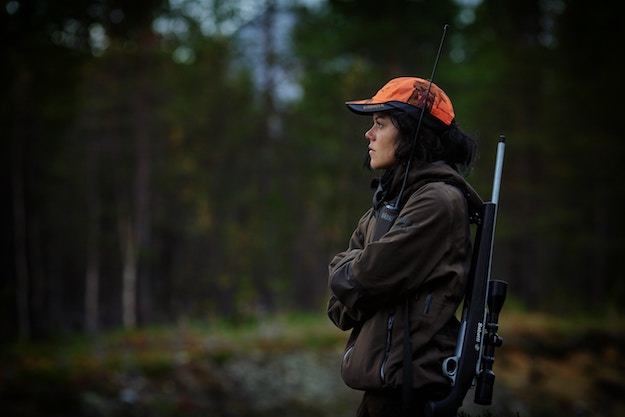
Responsibilities in being a hunter don’t end when you get a kill. You need to document everything and update the details via the internet or by phone. This will help wildlife authorities keep track of the specific game animal populations.
Benefits Of Learning To Hunt
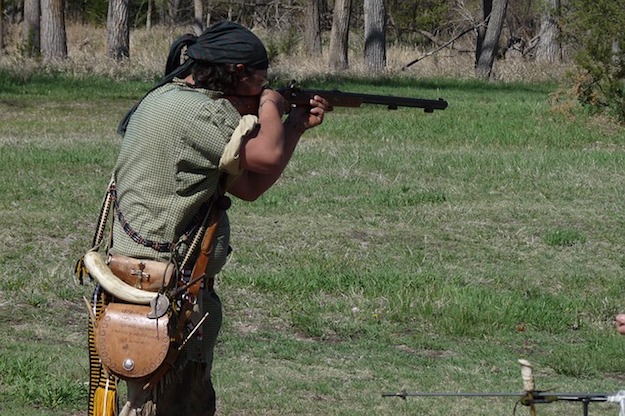
Let’s take a good look at just a handful of important benefits hunting can provide that have nothing to do with shooting and/or eating.
- Hunting helps you get familiar with the rural areas, discover landmarks, native species, and plants that could be useful in a survival situation.
- You’ll learn about the terrain and geology, where to find water, etc. The value of knowing your surroundings can’t be overstated.
- Spending time in nature, surrounded by the sights and sounds of native animals, plants, and trees has a calming effect. This will definitely come in handy when the SHTF, but it’s also very important in your daily life.
- Establishing good relationships. Far too often, we underestimate the simple power of sharing information and skills person-to-person. When you hunt, you develop contacts and relationships with farmers, ranchers, and other hunters.
Takeaway
If you’d like to pick up a new hobby that can provide just as many benefits in your life today as it will in a survival scenario, download “Hunt Great Deer” today – while it’s FREE!
Watch this video posted by deermeatfordinner as he shows what you need to know about duck hunting:
The only thing I ask is you leave me a review, good or bad I want to know what you think! I wholeheartedly encourage you to get out in the woods and learn about the sport of hunting first hand. Then, should you ever need to use your skills in an SHTF situation, you’re more than just mentally prepared, you will know exactly where to go and what to do.
Do you have anything more to add on learning how to hunt? Please add them in the comments below!
Here are 11 hunting guns you need in your arsenal you might want to know about!
Follow us on Facebook, Instagram, Twitter, Pinterest, and Tumblr!
The contents of this article are for informational purposes only. Please read our full disclaimer.
Featured image via wildlifedepartment.com
-

 Do It Yourself7 months ago
Do It Yourself7 months agoParacord Projects | 36 Cool Paracord Ideas For Your Paracord Survival Projects
-

 Do It Yourself9 months ago
Do It Yourself9 months agoHow To Make Paracord Survival Bracelets | DIY Survival Prepping
-

 Do It Yourself9 months ago
Do It Yourself9 months ago21 Home Remedies For Toothache Pain Relief
-

 Do It Yourself10 months ago
Do It Yourself10 months agoSurvival DIY: How To Melt Aluminum Cans For Casting
-

 Exports8 months ago
Exports8 months agoAre Switchblades Legal? Knife Laws By State

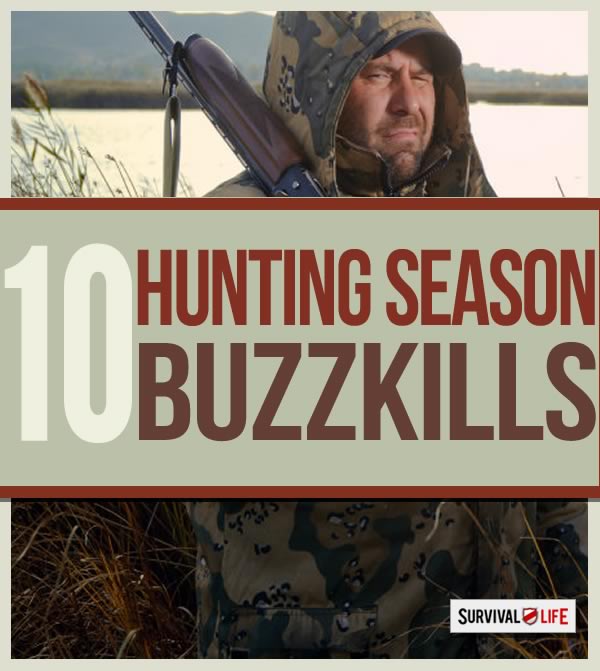

Al McLennan
February 28, 2013 at 8:45 AM
Thanks for the freeby. I plan to move to Tn and my new neighbor said he would teach me to hunt deer. At least with this booklet I won’t appear to be a total idiot.
chris g
February 28, 2013 at 8:55 AM
As a farmer, I am not thrilled to have strangers, let alone armed ones (hunters) on my property. In a crisis I would be less thrilled.
Nunya
March 4, 2013 at 2:02 PM
Chris G,
In California, we hunters run across your objections more and more often. Out of state it’s less common, but maybe my fellows and I have just been lucky; we have certainly been greeted with skeptical looks and attitudes, but apparently our charm has been enough to overcome them. 😉 It may also help that we are usually hunting “pests” like deer and antelope on farmland.
It is disappointing to those of us who hunt safely and ethically to be turned away from a plot because of this concern, but we understand that we have to battle either bad previous experiences or simply “erring on the side of caution.” Unfortunately, there’s no litmus test for determining in thirty seconds or less which petitioners are safe and which are not. Sometimes farmers and ranchers reach out to the state game department for depredation help, so perhaps only considering referrals from them will weed out the drive-ups from the hunters who aren’t afraid to talk to the game department about where to go. Landowners might also find out whether their states require Hunter Education before issuing a license, and/or ask hunters to present their certificates of completion.
For hunters (and this may be mentioned in the book, but I was too late to take advantage of the generosity of the author), in an effort to cultivate better landowner relationships:
• Call ahead, when possible. Sometimes landowner names and numbers are available from the game department or USDA. I was refused access by phone, but the landowner was appreciative that I had called, rather than drive onto his property and take my chances. That might make the difference if I try again in the future.
• Carry Access (or Trespass) permits (available from Fish and Game or something you make up) that a landowner can fill out and sign. You’ll have “written permission” and look better prepared and ethical than a poacher or yahoo.
• Consider carrying your Hunter Education certificate, if you have one, and offer to present it and your license to show you’ve taken the course and you’re legally licensed. Some states don’t require HE to get a license, and some farmers/ranchers may not know if it is required.
• Leave the guns in the truck. Knock on the owner’s door or approach him/her in the field unarmed, so they don’t feel threatened or that you’re so eager to hunt you’ll shoot over their shoulder the moment they agree.
• Change your clothes. If possible, scout and request access wearing street clothes. If you’re already camo’ed out for the field, make sure you don’t look like a bloody butcher. If you are in camo and you wear orange, especially if orange is required, wear it when you make your appeal: It will show that you’re at least compliant with the law, and if not required that you’re interested in safety.
• Ask where the landowner would prefer you clean your kill. Some won’t care, but others might prefer that your gut pile not attract coyotes, wolves, or pigs that bring more problems to their farm or ranch.
• Show your appreciation. We try to find out what the landowners drink, if at all, and leave some with them on our way home, whether we were successful or not. Some hunters offer to share some of their game, if they connect.
• Cover and stow your game. If you’re successful, no one, not even other hunters, wants to see your game splayed out across your roof or hood; It makes all hunters look bad and leads to things like categorical denial of access. Try to change out of bloody camo, too, before pulling into a diner or driving or walking around town.
Good luck and be safe!
ALBERT
March 4, 2013 at 7:48 PM
My Dad had a Cure for those that Choose to hunt on our posted land. He’d
Hunt their cars & pick-ups, Bagging a few Tires & Lics. Plates, And leave them Chained to the Local Police IMPOUND Yards. In no time at all, these Trespassers would leave our land, Never to return!As for Not Doing anything Wrong?, Trespassers, Hunting for Deer, Have a Bad Habit of, Cutting holes in :Line or Partition Fences, Shooting Cows, Sheep, Horses and other Livestock & Letting the Animal suffer a slow death instead of owning up to their mistake!, Then with the Invention of the SNOW MOBILE , Things really got out of hand!
Nunya
March 4, 2013 at 9:24 PM
Unfortunately, there are those who ruin it for everyone: Some by hunting posted land without permission, and some who do reprehensible property damage out of above-the-law self-justified revenge. That’s why I teach hunter education, both formally for the state and in impromptu situations like this. Some people poach and/or destroy property. Others hunt ethically, and use proper capitalization. For the purposes of the topic in this discussion, though, hunters who build and maintain relationships with landowners will have a better chance of having landowner friends when SHTF.
PS: If your land is posted to keep other people from hunting it, and you hunt it yourself, you’re a poacher, whether SHTF or not, at least in California.
ALBERT
March 5, 2013 at 9:26 AM
Your First Correct, A Good relationship with the Farmer/Land Owner is Paramount.
as For Calif. Laws, I Think I mentioned that this farm was in MICHIGAN. Each State has their own Laws, As such, What is practiced in one, may not be so, in others.
In other words, Know the Hunting Laws in the State your Hunting in, & Follow them!, The life you save, may be your own!!
Nunya
March 5, 2013 at 11:12 AM
1: That’s WHY I typed “at least in California.” My apologies for not spelling out the implied “Your state may differ” for those who couldn’t infer it on their own. If you typed “Michigan” out loud in any form, or in any of your posts, I failed to find it.
2: I’m supposedly “the reason landowners post their land,” and yet, I’m not the one advocating the destruction of others’ personal property and threatening others’ lives. How ironic that *I* might be the one hampering hunter-landowner relations. Good that you’re so personable and such a peach of a human being that people will flock to your personal and property defense when the SHTF.
Nunya
March 4, 2013 at 10:29 PM
Chris G,
An additional thought: If you develop a relationship with carefully screened and vetted hunters, then in a crisis you’ll be much more likely to have “friendly” guns on your property to help protect it from the ones that will surely flock to it as a result of the crisis.
Ken Kirkham
February 28, 2013 at 9:10 AM
Anyone seeking to hunt during a SHTF scenario had better know who owns the land and better have permission. I am serious about the sign on my property, “anyone entering my property without an invite or warrant will be treated as any other trespasser and shot on sight”.
Your lack of preparation is not a license to poach, steal, or in any other way take what is not yours.
If you want to go to the country and not be shot on sight you should go to the land owner and ask if he has work for you to earn food and shelter. That is the only way you may live through your attempt to go unprepared into the future.
during the depression people also hunted for food and in very short order there were no more deer to hunt.
I intend to provide work and food for refugees and expect to support up to 100 people on my land. The only way they get a chance to to ask for work…any other approach will not be acceptable.
Charles
March 1, 2013 at 7:23 AM
Well said sir: Your information is correct and I understand exactly what you are saying. Although I live in an urban environment, I was raised in the country and have hunted most all of my life. I look at the two local small lakes near my house and wonder how long the geese and duck population could stand heavy hunting. Then I look at the plethora of squirrels which inhabit the trees on my property and the neighboring subdivisions and wonder how long they would last under pressure. In a four year time span I killed 200 either by trapping or shooting with a 22. They were a nuisance and was causing damage to my house. I used to fish often and still could. The land my family and I hunt is 180 miles away and with the proper preparations we could in dire need go there. I have no doubt our farmer would let us help. The problem we would have is the interlopers who hunt on the property without permission. I think what you write is more than generous. I do think on these things and then I wonder which guns I would take.
ALBERT
March 1, 2013 at 7:17 PM
Well said CHARLES, Just Remember one thing: In a Land without LAWS, Every Honest Land Owner, Or Citizen, Becomes a Target, For those ILLEGALS & CRIMINALS whom NEVER OBEY the LAWS of the Land, Anyway.
As for those Criminals that are currently in Prison, They Represent only 5% of the,” Criminal Ice-Burg,” that is in our country as we speak.
The rest are just waiting to strike!
Doug
February 28, 2013 at 9:52 AM
A state with a population of 6 million people and 4 million deer: I’m afraid that will work like depending on the local Walmart store. Most of the country is settled, as you’ve already read the rural residents may know you are hungrry, but as with any limited resource with unlimited demand—. Perhaps you’d best pack some beans and bacon.
Please, remember you may get to the range once a month while the guy in the pick up- you know the one with the rifle rack, probably doesn’t go to a range.
The state where I live had a huge deer population. The federal government-the boys who got rid of the buffalo and starved Indians, decided we needed the gray wolf. Can you guess what happened next? We’ve gone from seeing 20+ deer a week to seeing 4. if we are lucky.
Nunya
March 4, 2013 at 2:05 PM
Time to adapt, then. I would be working on my recipe book for wolf.
Sara
February 28, 2013 at 12:14 PM
Very interesting. I agree with the commments above. I’m too old to do the outdoor thing but I have 15 grandsons to share this with.
ALBERT
February 28, 2013 at 9:41 PM
When buying a Car, It’s always good to know how to Drive first! & Know where your going to go.
Hunting is the same thing, Owning & shooting your gun is one thing, Hunting & Taking game, Another. However, Knowing Exactly How & when to CLEAN your Animal, is an All Time Important thing too know as well.
As a rule, No two animals are skinned the same, Hanging a deer is best, as with these large game animals, you’ll need a deep pit to catch the blood & Bladder Fluids, And if Possible hang the deer overnight [if the temp is cold]If you have thought ahead, Use Cheese Cloth to Cover the Now Cleaned Deer( After Gutting it) To help keep flies & Bugs from getting to the exposed body cavity.
Next, Comes the Skinning[ Though some prefer skinning First(Your Choice) ] The rest is rather straight forward, Using a BONE SAW, Cut off the Leg Joints first, Then the rest is easy. Except if your on the Trail, Then Preserving your Meat Becomes as Important as Getting it in the first place!
Nunya
March 4, 2013 at 10:42 PM
Skinning a cat, skinning a deer: many ways to do either. If the animal is hanging while you gut it, you have to battle it spinning and the entrails are likely to fall out of the cavity when you’ve freed them up, not to mention a wave of blood and other fluids if you damaged vitals. Digging a hole is probably not worth the effort, unless you’re gutting it in a highly visible place and don’t want to offend: The varmints will dig it up and devour it before morning whether it’s on the surface or buried. Being able to hoist your game up after gutting it can make it easier to drain out the cavity and skin it off the ground, but in a hoist-less (prairie) environment, skinning and quartering as you go can be done on the ground, one side at a time, using the hide as a tarp. T-shirts (old ones, if you’ve prepared, or the one you’re wearing if you’re under pressure) make excellent, breathable meat covers.
ALBERT
March 5, 2013 at 9:13 AM
Your the type that cause Land owners to post their land. Your reasoning is off, Digging a Blood Hole & attempting to Cover the Unused guts shows your care for the land your on, regardless if some beast dig it up later!
As for ground cleaning, it’s easier for sure, it’s also easier to contaminate the meat!
On the other hand, If Your POACHING & you want no incriminating Evidence, I can understand your Ground Skinning. Let the owner think it was a Beast vs beast kill.
However, you are correct, By hanging the deer, the Organs will Fill the lower body cavity, But in most cases, Most Hunters avoid cutting around the rectum until the organ meat ‘ Liver, Heart & Kidneys have been removed, Then a bag or container is used to catch the remaining fluids, to be disposed of properly, NOT Spread all over the area, thus exposing that area to blood born diseases, if any!
That brings up the next point in hunting, Make sure that the animal(s) you take, are feeding in an area that has NO Chemical Dumping History. This problem is getting very bad in some areas around the country. Once upon a time, some land owners would plant a acer or so of corn or wheat or other grain for the Game animals to feed on. . In a Must Need Time, Killing, Cleaning what you can Carry & Running away, May one day become S.O.P., But until then, ASK for Rights to Hunt on Anyones land!
Respect the Land & Make it open for other’s to use.
Nunya
March 5, 2013 at 10:33 AM
More interesting observations and I thank you for the opportunity for discourse. I’m sorry that my original post was too long for you to read things like asking the landowner for permission, being respectful of the landowner, asking where s/he would prefer you clean your game, etc.
Ironically, when I hit POST on my previous comment I realized that ground skinning would absolutely lower a hunter’s profile and would be an EXCELLENT strategy for when SHTF, which is what this forum began discussing, so that others in the area don’t see that you’ve got a buffet hanging from the limb of a tree and you’re armed only with a skinner. This is how crows take game from hawks, when they have to either defend themselves or eat under attack, jackals from lions, etc. Ground skinning can easily lead to greater contamination and requires greater attention, but also allows for it, since you’re less visible and can take your time.
We can run around in circles about the hole vs. surface deposit of entrails; for example, if you dig a hole and it gets dug back up by coyotes, you’ve left an ankle-breaking hole on someone’s property (like a cattle ranch?), instead of guts. I’ve been circled by bears as I clean game in the evening and when I return in the morning there’s nothing left of the pile. I’ve hunted the same plots the morning after cleaning game there in the dark and every scrap of it has been removed by scavengers. “Blood-borne diseases?” Come on! Millions of animals die and have died over the ground where we walk, hunt, build houses and playgrounds: It’s the cycle of life. Besides, if the animal has any “blood-borne disease” you’re not going to EAT it! Don’t be silly: Use a little sense and do your cleaning away from water, if possible: If you shoot a bear on the edge of a stream, I wouldn’t expect you to drag it a hundred yards away, but make reasonable efforts to keep the mess out of the water and remove the carcass as soon as possible.
I find your respect for landowners laudable, but at least a little ironic when you advocate destruction of personal property. That brings a new question to mind: If you don’t want someone on your property, how does it help get them off of it to destroy or steal their means of transportation? Wouldn’t you want to facilitate their exodus, rather than inhibit it?
Thanks for the chance to clarify my comments.
Pingback: Venison Recipes to Try This Winter | Survival Life - Survival Life | Preppers | Survival Gear | Blog
Pingback: Hunting to Live, Living to Hunt – Zombie Emergency Response Group (ZERG)
Pingback: The Importance of Body Armor | Survival Life
Pingback: Winter Survival Kit | Survival Life
Pingback: Crossbow Shooting 101: Tips Improve Your Crossbow Shooting Skills
Pingback: Things You Need to Live Off the Grid | Survival Life
Pingback: Top Squirrel Hunting Tips And Tricks For Beginners
Pingback: Top Squirrel Hunting Tips And Tricks For Beginners | Primitive technology
Pingback: Top Squirrel Hunting Tips And Tricks For Beginners - Survive!
Pingback: Top Squirrel Hunting Tips And Tricks For Beginners - Survival Patch
Pingback: Top Squirrel Hunting Tips And Tricks For Beginners – Ultimate Survival Alerts
Pingback: Bow Hunting | Try These Tips Before Hunting for Your Next Whitetail
Pingback: How To Practice For Bow Hunting | Primitive technology
Pingback: How To Practice For Bow Hunting - Survival Patch
Pingback: How To Practice For Bow Hunting – Ultimate Survival Alerts
Pingback: hog hunts
Pingback: 1xbet promo code
Pingback: سایت بت فوروارد